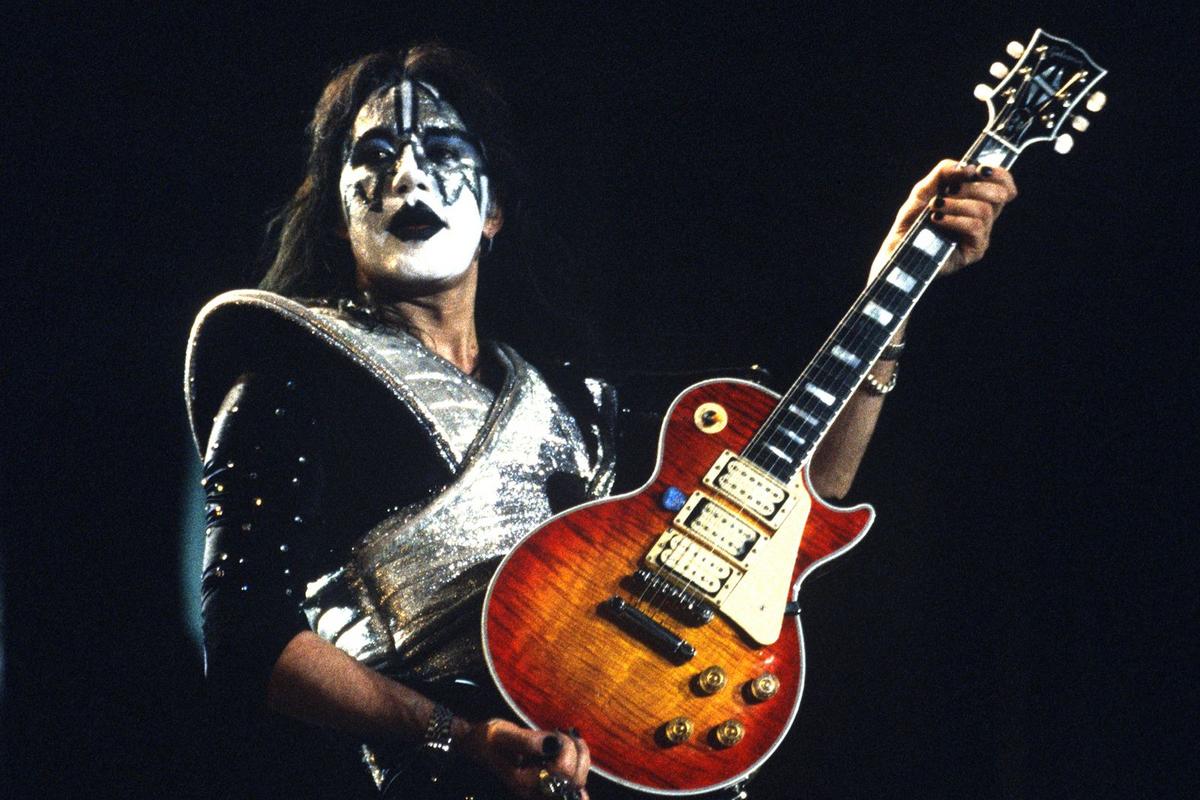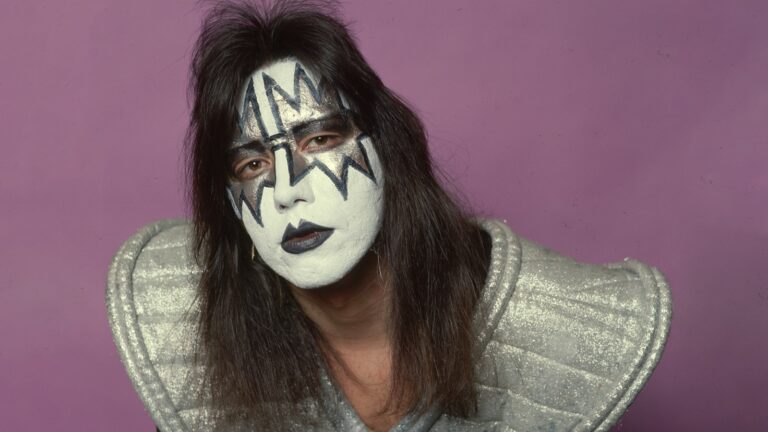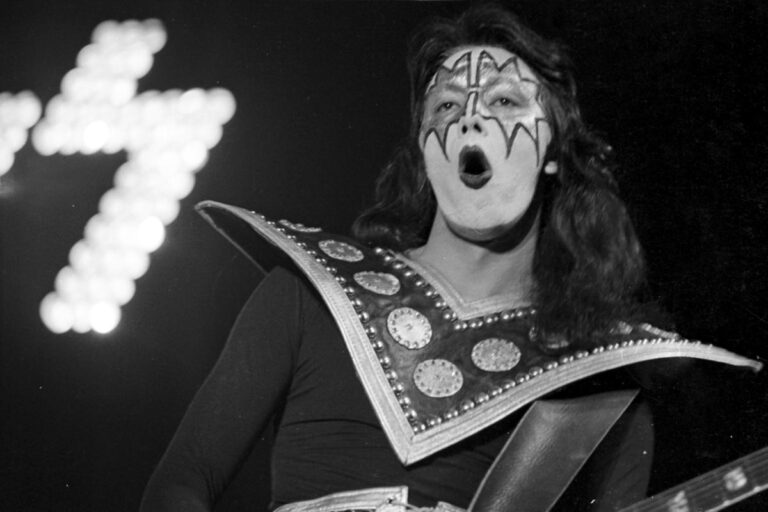Original Kiss lead guitarist Ace Frehley has died at the age of 74 after injuries suffered from a fall at home.
Earlier this month, Frehley canceled his remaining 2025 tour dates, citing unspecified “ongoing medical issues” related to that accident. Earlier today it was reported that he had suffered a brain bleed and was on life support.
“We are completely devastated and heartbroken,” reads a statement from his family. “In his last moments, we were fortunate enough to have been able to surround him with loving, caring, peaceful words, thoughts, prayers and intentions as he left this earth. We cherish all of his finest memories, his laughter, and celebrate his strengths and kindness that he bestowed upon others. The magnitude of his passing is of epic proportions, and beyond comprehension. Reflecting on all of his incredible life achievements, Ace’s memory will continue to live on forever!”
How Ace Frehley Rose to Stardom With Kiss
Best known as the “Spaceman” of the massively popular face paint-wearing ’70s rock group, Frehley’s unique and self-taught playing style inspired many future guitar heroes.
His love of early pioneers such as Jimi Hendrix and Jimmy Page ensured that Kiss kept at least one foot solidly planted in their hard rock roots, even as the band became a mainstream merchandising machine and branched out into pop and disco near the end of the decade.
Paul Daniel Frehley was born into a musical family on April 27, 1951 in New York City. The “Ace” nickname came from his high school success at scoring dates. He began playing guitar at age 13, and eight years later answered a classified ad posted by Paul Stanley, who together with Gene Simmons and Peter Criss were looking for a lead guitar player with “flash and ability.”
He didn’t make the most positive first impression. “Some guy walked in with an orange sneaker and a red sneaker,” Stanley recalled. “I thought a bum had walked in off the street, except he was carrying a guitar,” Simmons added.
Luckily, Frehley’s guitar playing did the talking. “When we all plugged in and played together, there was just magic,” Stanley remembered. Simmons agreed: “As soon as he played, it was like, ‘This is it.’”
The four members of Kiss each adopted comic book-style makeup and costumes, refusing to let their real faces be photographed in public. The band quickly earned a reputation for their bombastic live show, which would grow to include levitating platforms, pyrotechnics and smoking guitars as their popularity grew.
After their first three albums failed to connect with a mainstream record buying audience, 1975’s Alive! catapulted the group to superstar status. They remained there for the rest of the decade, although Frehley was growing displeased with his back seat role in the group.
Ace Frehley’s Successful Solo Endeavors and Exit From Kiss
In 1978, partly to relieve interpersonal tensions within the band, each member of Kiss simultaneously released a solo album. Frehley’s was a revelation, the best-reviewed and best-selling of the four, and featured his Top 20 cover of the song “New York Groove.”
Read More: How Ace Frehley Set Out To ‘Show Those F—ers’ on His Solo Debut
Although that success earned him equal space with Stanley and Simmons on Kiss’ next two albums, substance abuse issues and a dissatisfaction with the increasingly pop direction of the band’s music led Frehley to withdraw from the group after the recording of 1981’s disastrous concept album (Music From) “The Elder”.
In 1987 Frehley launched his solo career with the well-received Frehley’s Comet album, the first of three records he’d release in as many years. In 1996 he reunited with Kiss for a series of highly successful reunion tours, although the same creative, substance abuse and interpersonal issues that had plagued the foursome before eventually rose up again, leading him to leave the band for good in 2002.
Ace Frehley’s Later Years: Sobriety, Career Revival and Tensions With Kiss
After finally overcoming his substance abuse issues in 2006, Frehley relaunched his solo career with renewed vigor, touring steadily and releasing well-reviewed albums such as 2009’s Anomaly and 2014’s Space Invader.
He maintained a testy relationship with his former band mates in Kiss after leaving the group for the second time. He, Simmons and Stanley would occasionally appear on each other’s solo records, but were just as likely to trade nasty barbs and threats in the press.
When the group’s original lineup was inducted into the Rock and Roll Hall of Fame in 2014, various disagreements kept them from performing together, and neither Frehley nor Criss joined the group onstage for any of Kiss’ End of the Road retirement show tours.
But a bond clearly remained. “Despite the many ups and downs I had with Kiss over the years, I couldn’t help but remember all the fun we shared in our formative years,” Frehley declared in his 2011 autobiography No Regrets.
“We achieved greatness in the music industry and had several groundbreaking achievements well into the new millennium. To this day I still consider them my brothers in rock ’n’ roll and love them.”
Frehley’s influence is most clearly measured by the number of younger guitar heroes who credit him with inspiring them, a long list that includes Pantera‘s Dimebag Darrell, Pearl Jam’s Mike McCready, Anthrax‘s Scott Ian, Guns N’ Roses‘ Slash and Motley Crue‘s John 5.
“I’d probably have practiced a little more If I knew I was going to affect that many people’s lives,” Frehley told Guitar Player in 2024. “It does make me proud and very happy though that I influenced a lot of great guitar players.”
In Memoriam: 2025 Deaths
A look at those we’ve lost.
Gallery Credit: Ultimate Classic Rock Staff



